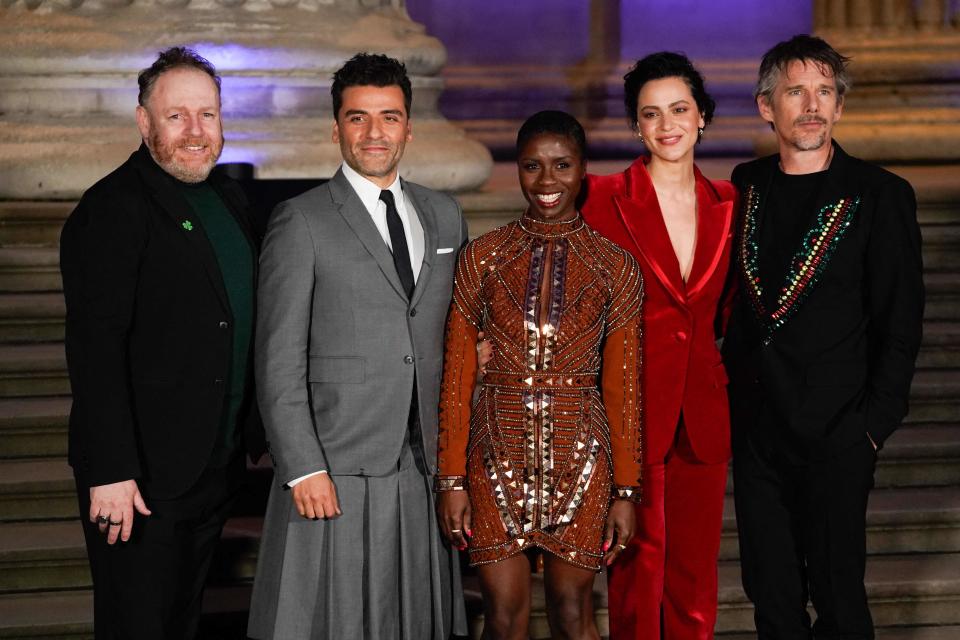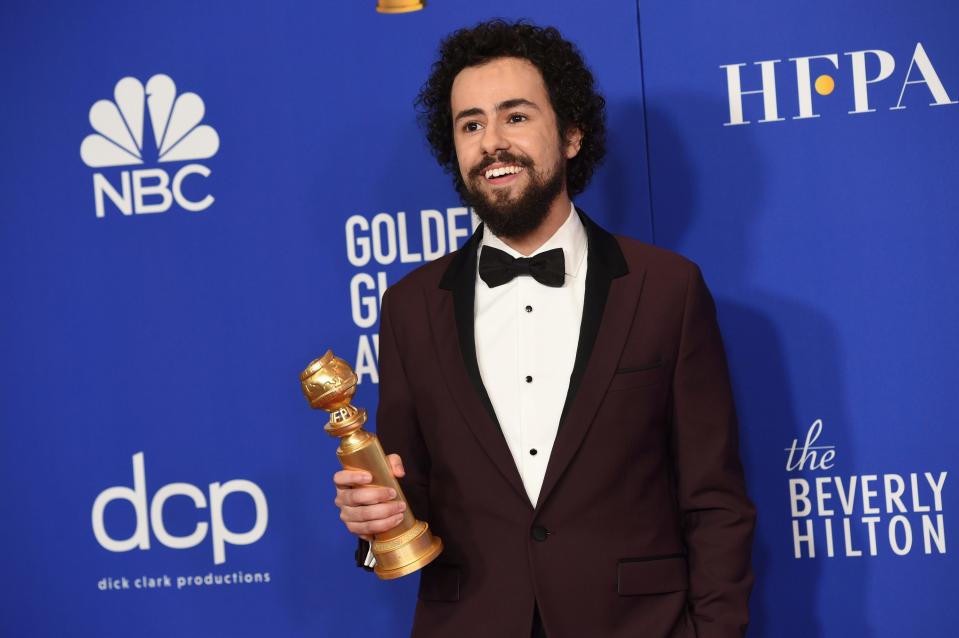Hollywood has stereotyped Arabs for decades. Is it finally changing?
- Oops!Something went wrong.Please try again later.
- Oops!Something went wrong.Please try again later.
- Oops!Something went wrong.Please try again later.
- Oops!Something went wrong.Please try again later.
Jenna Bosco was thrilled to land the part of the authoritative Officer Finley opposite Edie Falco on CBS’s “Tommy,” a police drama that aired for a season in 2020.
But the episode made her uneasy. It portrayed a young Saudi woman who steals a diamond ring and hits Bosco’s character in the face to get herself arrested, claiming she wants help to avoid being sent home. She will be locked away or killed if she goes back, she tells police.
“It had all the hallmarks,” Bosco said in an interview, describing oppressed Muslim women, references to beheading and filthy-rich parents who wield wealth and political power to get their way. “It just felt so trite and Orientalist in terms of the stereotypes and tropes we always see presented on TV.”
Hollywood has long depicted Middle Eastern and North African characters in simplistic and offensive ways, often as terrorists, informants, oil sheiks or women in need of saving. The portrayals are as old as Hollywood itself, but those narratives are finally starting to change and broaden with the emergence of new television programs showing them as richer characters with varied storylines.
In many cases, the changes have been ushered in by MENA actors, producers and screenwriters themselves, who are creating their own content and rallying for change in an industry once stacked against them.
Today, viewers will find “Ramy” on Hulu, about an Egyptian-American millennial in New Jersey grappling with his faith. They can check out “Mo” on Netflix, about a Palestinian asylum seeker hustling in Houston to support his family in poignant, often hilarious situations. Or they can follow Marvel’s first Egyptian superhero, Scarlet Scarab, who uses supernatural forces drawn from ancient tradition, in "Moon Knight" on Disney+.

Despite these gains, insiders say there is a long way to go to increase representation, end stereotyping and bring their diverse stories to the screen.
'Reel Bad Arabs'
Jack Shaheen shined a damning light on Hollywood with the 2006 release of his documentary “Reel Bad Arabs: How Hollywood Vilifies a People” and released a book of the same name.
Reviewing 1,000 films from the 20th century, he found Arabs commonly shown as brutes, uncivilized people and religious fanatics with a love for wealth and power. Of those films, just 12 depictions were positive, 52 were evenhanded and the remaining 900 or so were negative, Shaheen found. To him, it was clear: Hollywood had made Arab synonymous with “bad guy.”
Today, Arabs and other peoples with roots in the Middle East and North Africa region are still fighting for roles in film and television that aren’t peddling racist tropes. Television shows likes FX’s "Tyrant" and "Homeland" showcased Arab characters speaking in heavy accents and being hostile and vicious — prompting street artists tasked with creating a graffiti backdrop to subversively scrawl “Homeland is racist” in Arabic, a snub that made it on the air in 2015.
Actress Azita Ghanizada, founder and president of the MENA Arts Advocacy Coalition, cited MCU’s "Moon Knight" as a positive example. “It has a terrific main actress who is a superhero," she said, referring to the Bahraini born, Egyptian-Palestinian actress May Calamawy. "Her identity is complex. Egyptian creatives behind the camera helped shape the textures and the layers within. The music and the location are culturally accurate."
Even when Hollywood tried to do better, there were noticeable failures. Often, the characters were still enmeshed in stories about terrorism and national security, even when they were the "good guys."
Take Sayid Jarrah on “Lost,” played by South Asian actor Naveen Andrews. He is kind and intelligent. He plays an Iraqi, and not some amorphous, menacing Middle Eastern character. But his storyline is tied to terrorism, as he was a past interrogator in the Iraqi army who worked with the CIA to infiltrate a terrorist cell.
Among the most interesting and beloved Middle Eastern characters is Abed from NBC’s “Community,” even though he, too, is played by a South Asian actor. In one cringeworthy episode, his female cousin from the Gaza Strip visits, wearing a niqab they mistakenly call a burqa, a face-covering garment not commonly worn by Palestinian women. The Arabic dialect is wrong, and the accents are off base. The cousin secretly sheds the “burqa” so she can play in a bounce house — an act her uncle has forbidden.
Television blunders like this show just how badly MENA people are needed not just in acting roles, but also behind the scenes, advocates say. Their input makes a huge difference, Ghanizada says.

“That’s how diversity moves forward,” she added. “Our community takes control of the narrative.”
It helps immensely that MENA actors, screenwriters and producers are organizing and forming coalitions to flex their voice in Hollywood. In 2017, the MENA Arts Advocacy Coalition got the Screen Actors Guild to add status for Middle Eastern and North African performers — the first time the MENA community has had unique status. Previously, they were counted as white.
They also launched a database of MENA and South Asian talent in the entertainment industry to connect them with film productions, studios, hiring managers and casting. To hold entertainment executives accountable, the coalition also commissioned reports showing how underrepresentation is still a major problem.
Other groups, like the Arab Film and Media Institute, the Pillars Fund and the Muslim Public Affairs Council, with its Hollywood bureau, are also raising the profile of MENA creatives in the industry and pushing for more diverse roles.
“We want to be able to do everything, play every character,” Ghanizada said.
'A remarkable moment'
In interviews with industry insiders and advocates, a sense of hope was tangible. The door is opening, and it’s having a ripple effect, with more nuanced shows following suit, they said.
Among their demands: Don’t reduce us to a religion.
“We want stories about Muslims, but we also want to see characters who don’t have to be solely defined by their religious identity,” said Evelyn Alsultany, an expert on the history of representations of Arabs and Muslims in U.S. media. "That may be part of your background, but it doesn’t have to be this thing defining your identity at the forefront.”
Alsultany listed fascinating Muslim characters she has seen on recent shows like "Orange is the New Black," "The Bold Type," "FBI" and "Love, Victor."
“I can list maybe 15 or 20 right now,” she said. “It is a remarkable moment.”
Hollywood has long conflated Arab and Muslim, even though the MENA region is home to just 20% of Muslims worldwide, and most Arab Americans are Christian. The hope is that as programming expands, MENA diversity will be showcased.
“Right now, we’re starting to see a detangling of these identities and a wider portrayal of who Muslims are, and it includes Arabs,” Alsultany said.
Change is being spearheaded by a younger generation who grew up in a post-9/11 era and want to tell their own stories. Rutherford native Ramy Youssef has been among the biggest names to blaze that path.
In 2020, Youssef won a Golden Globe for best actor in "Ramy" for his portrayal of a first-generation American Muslim pulled between tradition and his life as a young millennial. Youssef, an Egyptian American, plays himself in the show.

He has lifted up other MENA talents, employing them and supporting their work. Youssef was a co-creator of “Mo” on Netflix, whose star also had a role in "Ramy." He also has a two-season order for his animated series titled "#1 Happy Family USA,” a comedy about the experiences of a Muslim American family.
Such success can inspire others to follow suit.
Ghanizada, who has had roles in shows like “Good Trouble” and "United States of Al" and acted in Broadway’s “The Kite Runner,” speaks to college students around the country about her work. They are awed to see their names and languages included “in a way that is nonviolent," she said.
“They feel so seen," she said. "It’s almost like, how did you do it?”
The MENA creative community has also been helped by changing technology, said Serge Bakalian, executive director of the Arab Film and Media Institute. It's cheaper and easier than ever to create content. Meanwhile, platforms like YouTube and TikTok give unknown artists a way to be seen.
The biggest boon was the advent of streaming, Bakalian said, which has given more room for layered storytelling for a diverse audience.
“The audience sees characters and stories and people who might not look like them or speak the same language and may not have the same religious affiliation,” Bakalian said. “But they are going through the same experiences, whether it be heartbreak, working-class issues or challenges with their parents.”
'You don't look Middle Eastern'
Despite these gains, challenges continue for diversity in MENA casting.
Jenna Bosco, walking into auditions, has had white casting directors tell her she doesn’t look Middle Eastern enough. With her tightly coiled curls, full lips and olive-brown skin, people assume she is Latina, biracial or Black, she said.
She is Egyptian American on her father’s side of the family. The casting director does not know much about MENA people, she reasons, but she finds it offensive.
“Because I have curly, kinky hair and I look the way I do, there’s pushback on me," she said. "In their mind, I have to have straight hair and big eyebrows. That’s what they think Middle Eastern looks like.”
How do your favorites stack up?: A study ranks the top 100 most inclusive movies
She had a very different experience when she tried out for the role of the title character’s sister in “Ramy.” Youssef, the star and creator, told her: “You look just like my sister,” Bosco recalled, and he showed her a picture.
She didn’t get that role, but she did have a part in the show’s pilot episode. She has appeared in other programs, including a recurring role as Paramedic Herrera in "New Amsterdam." She also wrote and directed the short film "Baladi My Country," and created a web series called "New Heights".
The industry isn't easy on Arab women, she said. Gender disparities are wide and LBGTQ characters are lacking, Bosco said. “That bothers a lot of us, and that really needs to change,” she said.
There are exceptions. “Search Party” star Alia Shawkat, whose father is Iraqi and Muslim, is openly bisexual. Disney star Josie Totah is Palestinian American, Christian and a trans female.
Today, Bosco is living in Hollywood and working on scripts for pilots. One is about a female doctor, the lead character, who is running a nonprofit clinic for urban youth in New York City. The character is Muslim, but the show isn’t about religion.
More: The biggest films of 2022 went backwards on diversity progress, study finds
“There’s so little nuance in general with Hollywood as it is,” Bosco said. “They want to place us in these boxes. What I hope is for the next chapter of storytelling, especially in Western storytelling, is that we see people for just being people and that the experience of being Arab is not all the same.”
This article originally appeared on USA TODAY NETWORK: Arab, MENA actors and producers are shaking up Hollywood

